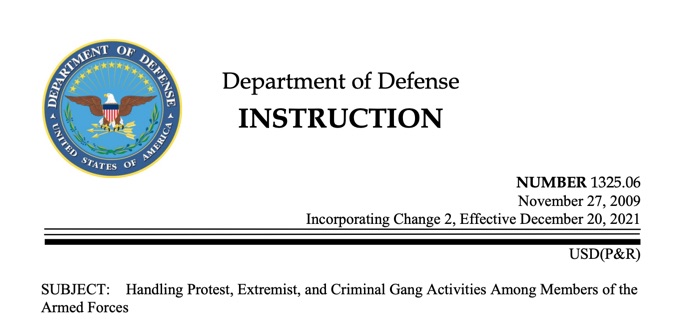
The Pentagon has announced that it has updated the rules for how it handles situations including when military members post or react on social media expressing support for extremism or extremist groups. The rules, which govern service members in the Army, Navy, Air Force, Marines, and Coast Guard, are outlined in the DOD document “Handling Protest, Extremist, and Criminal Gang Activities Among Members of the Armed Forces“. Now if a service member “likes” or “shares” a post in support of extremist activities, they can be held accountable.
In the rules, “liking” on social media is defined as “The use of the “like” function on social media platforms, generally to signal endorsement or support of the “liked” content. Liking includes the use of emojis or reactions that signal endorsement or support, or platform specific actions such as “favoriting,” when also implying endorsement. Liking, in the context of the communication concerned, must imply or state endorsement, agreement or promoting of the content.”
“Sharing” is defined as “In the social media, electronic, or cyber context, an action taken to replicate content from one online location to another (with or without additional comment), typically for viewing by other members of an individual’s social media network. Sharing also includes, but is not limited to, platform-specific terms such as “re-tweeting.”
Generally speaking, the rules prohibit any military personnel from actively participating in extremist activities, where active participation includes “Engaging in electronic and cyber activities regarding extremist activities, or groups that support extremist activities – including posting, liking, sharing, re-tweeting, or otherwise distributing content – when such action is taken with the intent to promote or otherwise endorse extremist activities. Military personnel are responsible for the content they publish on all personal and public Internet domains, including social media sites, blogs, websites, and applications.”
In the transcript of the background briefing on the rule changes posted to the Department of Defense a defense official explained that “liking something with the intent to promote or endorse an extremist activity would be violative of the policy.”
The Internet Patrol is completely free, and reader-supported. Your tips via CashApp, Venmo, or Paypal are appreciated! Receipts will come from ISIPP.
Also in that transcript (which we encourage you all to read if only because it’s very interesting), a defense official (their names were all redacted) explains that “we went from having absolutely no policy on social media rules to actually incorporating policies on social media rules in the new DODI 1325.06. So it basically clarifies, as [Defense Official 1] was just saying, that service members are responsible for the content that they publish on all personal and public internet domains, including social media sites, blog websites, and applications.”
Now, as they also make readily clear in the transcript, there is no way that the military can police the social media presence of all of their members, however if someone such as another service member brings something to the attention of the command, the intention is to review it, and deal with the service member accordingly.
You can read the entire set of rules, originally promulgated in 2009 and updated on December 20, 2021, here on the military’s U.S. Executive Services Directorate website.
The Internet Patrol is completely free, and reader-supported. Your tips via CashApp, Venmo, or Paypal are appreciated! Receipts will come from ISIPP.










There’s already a lot of material in the UCMJ that restricts public speech – Articles 88, 89, 91, 133 and 134. Active duty military, especially officers are held to a higher standard. [Link deleted]. You have First Amendment rights – until they bump into the UCMJ. I’m pretty sure there are some phone numbers you can call for free advice in the area – google/ddg should turn them up.
“Also in that transcript, a defense official (their names were all redacted) explains …”
Interesting that they didn’t want THEIR OWN names associated with the new rules. I can understand the concerns, but I think what’s covered in this article, itself, constitutes extremism, and violates the Constitution’s guarantees of freedom of speech.